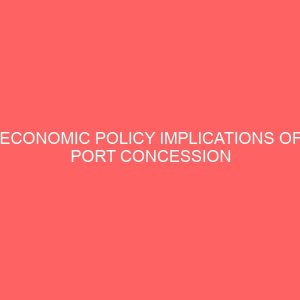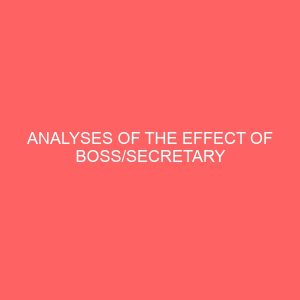Description
DIFFICULTIES ENCOUNTERED BY SECRETARIES IN OPERATING A COMPUTER
CHAPTER ONE
INTRODUCTION
1.1 BACKGROUND OF THE STUDY
Oparah (2003) described a computer as an electronic device that is capable of solving problems by accepting data, performing prescribed operating on the data accepted and supplying the results of those operations. In other words, computer is an electronic device, which can accept data, process the data and produce results / information automatically under program control.
Eyitayo, et al (2007), described computer as any machine or device which, under the control of a stored program, can accept data in a prescribed from, process the data and supply the results as information in a specified form.
Ahukannah (2003) stated that the computer is now doing the function of manual and electronic typewriters and other official work much better. Therefore, an office that has a computer it has no need for a manual or electronic type writer and other official works under normal circumstances.
Ohakwe (2002) advised that attempt should be made to look at the office. Furthermore, the secretary’s works dynamics environment packed full with conflicting situations and instruction so much that no two days are exactly the same. The conflicting decisions and instruction crop up all the time demand or needs prompt attention and decision secretary is a vital person in the administrative machinery that working with an out-modeled and un-serviced computers can make the job unattractive and the secretary unproductive and inefficient. It is hoped that at the end of the this study, it will provide or identify the problems encountered by secretaries in operating computers.
1.2 STATEMENT OF THE PROBLEM
Although the main purpose of computerization is to increase office productivity and quality of products, these significant transformations may involve an element of risj to the secretary as well as effecting her performance. The secretary has to be aware and prepared for these. Ahukannah (2000) stated that the cause of one of the problem militating against automation of office, many firms that could use automated system effectively may not have the resources that mach their demands. Inadequate training and skills requirement is another problem associated functions well in environment where electricity supply is constant. Generators ought to be provided but the cost is much and not every organization that are willing or desire can afford the amount for it. Due to availability of various types and models of computer in the market, one finds it difficult to make a choice. One of the factors in choosing computer is the type of work for which it is needed for.
1.3 PURPOSE OF THE STUDY
The major purpose of this study is to identify the difficulties encountered by secretaries in operating computer. Specifically, the study attempt to.
Identify the problem of inadequate training and skills required in computer operation.
Identify and examine the problem of power supply.
Identify the problem of lack of knowledge of the computer.
Find out if there are difficulties in the carrying out routine maintenance.
Determine the difficulties in connecting the part of the computers.
Evaluate problem in controlling and managing viruses in the computer
1.4 RESEARCH QUESTIONS
The research question are:
What are the training skill required in computer operations.
What are the problem of power supply.
What is the knowledge required by secretaries in the computer.
What are the difficulties for the secretaries in carrying out routine maintenance.
What are the difficulties in controlling and managing viruses in the computer.
1.5 SIGNIFICANCE OF THE STUDY
The result of this study will help all student secretaries to identify some problem facing them in handing computers. It will also explain how important secretaries are in an organization and also that many unique things secretaries, that is, their strongly believed that after going through this study, it will serve as a useful tool as it will be informative and educative to prospective students secretaries and all practicing secretaries at large.
1.6 SCOPE OF THE STUDY
This study tends to look at the difficulties encountered be secretaries in operating a compute and also fine the necessary solution to the problem so far.








Reviews
There are no reviews yet.